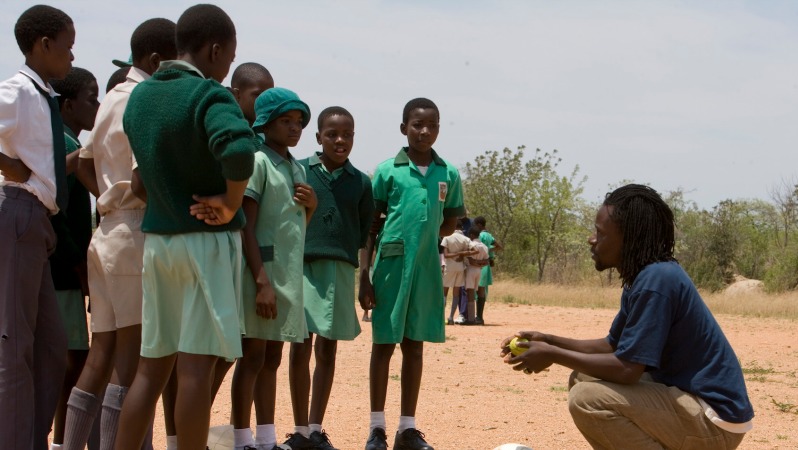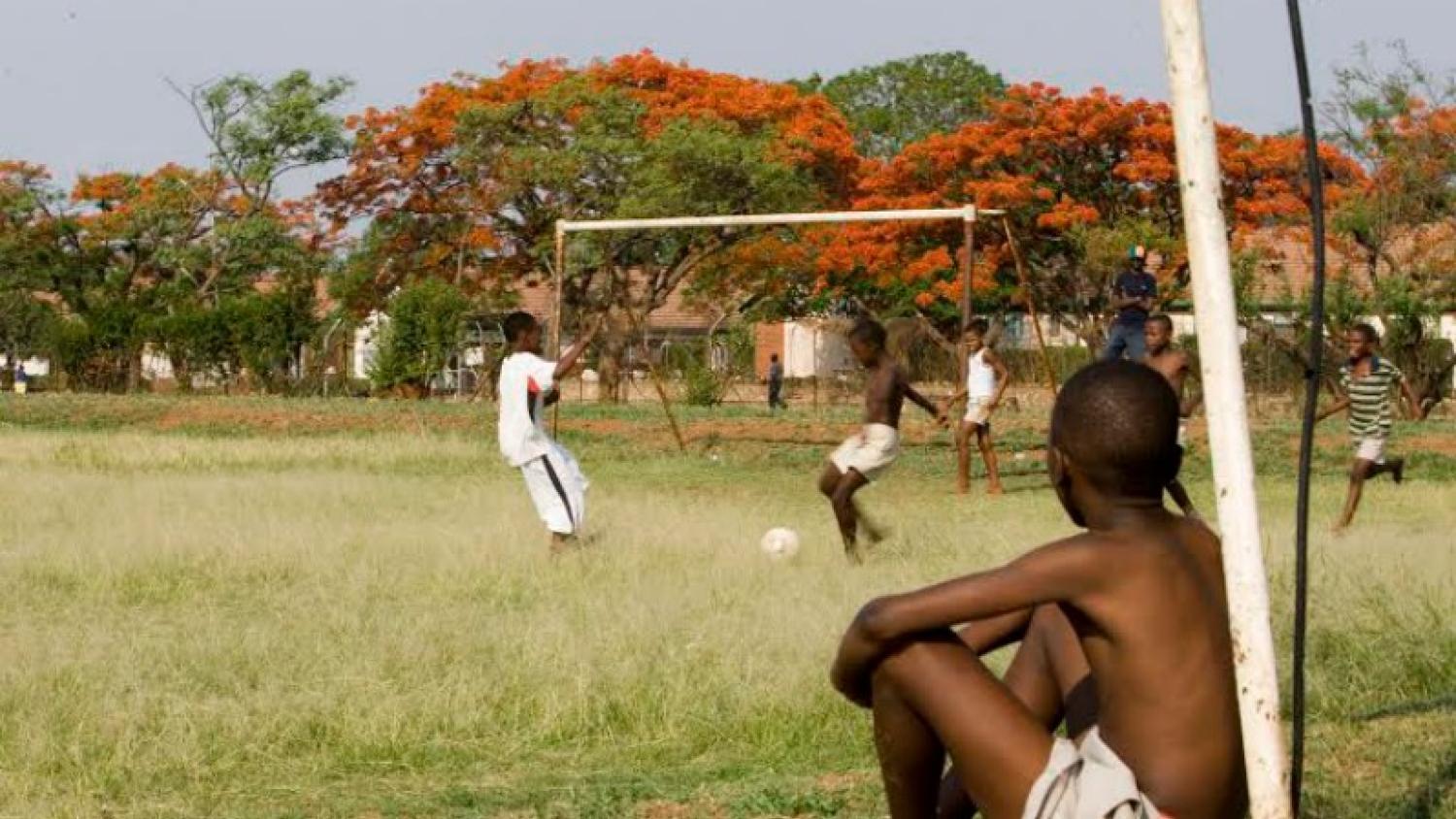Part 1: Silence
It is the late nineties in Bulawayo, Zimbabwe. There is a funeral every week. Thousands are dying. They are getting sick, and then they are dying. Loved ones come to the funerals to mourn, to talk to the deceased's family, to try and console them, and then they leave with the thought of the next funeral heavy on their minds. That is the way this sickness operates. It is invisible and unspoken, but it is in everyone's future, even as it haunts their present. The sickness infects its very own name, and no person can bring themselves to say it. It is the late 90s in Bulawayo, Zimbabwe, and the town is becoming a part of the most horrible of statistics: average life expectancy, 35 years.
It is just past the turn of the new millennium, and Tommy Clark is in his residency in San Francisco. He treats those infected by HIV and AIDS, but he can't help but think back to his time in Bulawayo. He used to play for Highlanders F.C., the local professional soccer team in Bulawayo, and had seen the devastation of AIDS first hand. He had attended funerals for teammates, friends, and their families.

Tommy Clark. Photo Courtesy of Grassroot Soccer
As he worked in San Francisco, he knew that no one talked about HIV or AIDS in Africa. They were silenced by a cruel side effect: stigma. How could he change this? He looked into his past, drew upon his education, and contacted three friends, all former players for Highlanders F.C.
Part 2: Soccer As A Solution

Photo Courtesy of Grassroot Soccer
What Tommy Clark and his three friends – Methembe Ndlovu, Ethan Zohn and Kirk Friedrich –realized was that the first step to turning the tide against HIV/AIDS was to remove the stigma surrounding the disease. People were so afraid of being associated with AIDS that they wouldn't even voluntarily test themselves. A conversation needed to be had, and, as Molly McHugh, Communications Director for Grassroot Soccer's Global Team, explains, “Where did most conversations start?...They started either on the soccer field, or about soccer.”
Like so much of the world, Zimbabwe is obsessed with soccer. Children grow up playing soccer anywhere they like, with a ball made out of anything they can find. As they grow, they find out about the world of professional soccer. They learn how countless African players have made it to the highest leagues in the world. These professional athletes are then idolized by those children, and they become their role models. So, in a land where soccer rules, those who play it better than anyone else carry huge weight in the community, especially among young people. Realizing this, Clark hit upon a solution for how he could reach young people and achieve his goal to educate the masses about HIV/AIDS. The silence could finally be broken.
Part 3: People SKILLZ

Photo Courtesy of Grassroot Soccer
With their philosophy established, Clark, Ndlovu, Friedrich, and Zohn could begin to grow Grassroot Soccer. By recruiting soccer coaches and professional players, Grassroot Soccer had its voice, and with soccer, it had its language. The vocabulary, however, still needed to be established. Grassroot Soccer needed to have the most up-to-date information it could find on HIV/AIDS, and it needed to flesh out exactly how it would use soccer to spread that information to young people. All of this would take time, and no small amount of money. In short, the four founders needed to do a little fundraising.
Raising money for non-profit associations – especially those in their infancy – is a notoriously competitive proposition. There is no shortage of good causes, with many smart and ambitious people behind every project. Grassroot Soccer made itself stand out by committing to a policy of self-evaluation. As soon as a curriculum was established, it was tested and analyzed rigorously in order to ensure maximum effectiveness. This self-critical and adaptive attitude was attractive to the Bill & Melinda Gates Foundation and Draper Richards Kaplan Foundation, who were some of the earliest donors. They understood the vision of Grassroot Soccer, and had the confidence to back the project before anyone else.
In time, Grassroot Soccer settled on their SKILLZ curriculum, a soccer-based educational product that would teach young people the truth about HIV/AIDS. The first program was held in the very place that had connected the four founders: the town of Bulawayo.
Part 4: Making a Difference
Since its introduction, Grassroot Soccer has been a resounding success. The organization is now established in over 40 countries worldwide, and has flagship sites in Zimbabwe, Zambia, and South Africa. An astonishing 685,000 young people have gone through the programming, and all four of the original founders - Tommy Clark, Methembe Ndlovu, Ethan Zohn, and Kirk Friedrich – are all still leaders within the organization.
Graduates from the SKILLZ curriculum are much more likely to support an HIV+ classmate than non-graduates, five times less likely than peers to begin having sex between the ages of 12 and 15, and in Zambia rates of voluntary testing among graduates are double the national average. Soccer really can be more than just a game, and, as McHugh puts it, “it's amazing when [people] realize something they are already passionate about, can be a vehicle for good.” People are getting over their fear of HIV/AIDS. The stigma is being broken, one kick of the ball at a time.
Part 5: All Adventurous Women Do

Photo Courtesy of Grassroot Soccer
One of the main challenges for Grassroot Soccer was how to reach the most at-risk group of people: young women aged 15 to 24. The highest rates of new HIV infection are present in this age group of women, but, according to McHugh, only 11% of women in southern Africa have access to soccer. This means that Grassroot Soccer first needed to bring them soccer, and then the real learning could begin.
To accomplish this, the organization specifically set time aside every week for girls to play on their own. Football for Hope community centers, a legacy of the 2010 World Cup, have been a huge boon to the cause. These places give girls a safe, fun, and welcoming place to enjoy the game of soccer. And while Grassroot Soccer takes pride in the training of all its coaching staff, it places special importance on its female coaches. The need to have coaches that the girls can relate to is real, and to have professional women teaching young women about the game of soccer, and the dangers of HIV and AIDS, is a necessary component.
The boys in the program also benefit from seeing their female peers at play. Often, these boys never think of girls as athletes, or interested in soccer at all, for that matter. These girls-only sessions allow boys to see girls as the athletes that they are. As they reconsider their preconceived notions of who girls are, boys can only be more likely to consider them as equals.
Epilogue: An AIDS-free Generation, A Look Into the Future

Photo Courtesy of Grassroot Soccer
As Grassroot Soccer looks into its future, it must figure out how to deal with a problem that faces so many good causes: apathy in the aftermath of success. Make no mistake, in the fight against AIDS, battles have been won. In the last decade, new infection rates in South Africa have declined 30%. But, the fight against AIDS has a long way to go.
With so much time and money having been dedicated to the eradication of AIDS, and with so many useful discoveries in that vein, the fight against AIDS is still in danger of losing momentum. And that, says McHugh, simply cannot happen, “HIV and AIDS is at a huge turning point where we actually know how to stop the spread of the disease. We know what works, and we're getting really...close to a tipping point, where we can actually, realistically... think about an AIDS-free generation not too far in the future.”
In its attempt to realize this dream, Grassroot Soccer has its focus set on what it can do to help. Rising levels of voluntary HIV/AIDS testing and treatment has been – and will be – a goal, as these levels act as a barometer of sorts, not only for people's willingness to take HIV and AIDS seriously, but for how healthy the population is in regards to the disease.
At the forefront of the future is the empowerment of young women, as well as the related issue of addressing harmful gender-based norms, such as gender-based violence. All of this will lead to young women retaining their power of choice in sexual experiences, leading to fewer unwanted sexual acts, and fewer sexual transmissions.
Humanity is far away from having to be told that soccer matters, it is a burning passion across the planet that isn't going to flicker anytime soon. This, perhaps, is Grassroot Soccer's greatest strength: that its accessibility and reach is backed by an already existing passion, but the strongest of winds matters little when you put the sail away. We cannot give up now, because, in the words of McHugh, “If we push now, we realistically can see the end of AIDS in our lifetime.” It is time to rig up our support, and reach a new, AIDS-free world.
Visit grassrootsoccer.org for more information and go here to donate.



